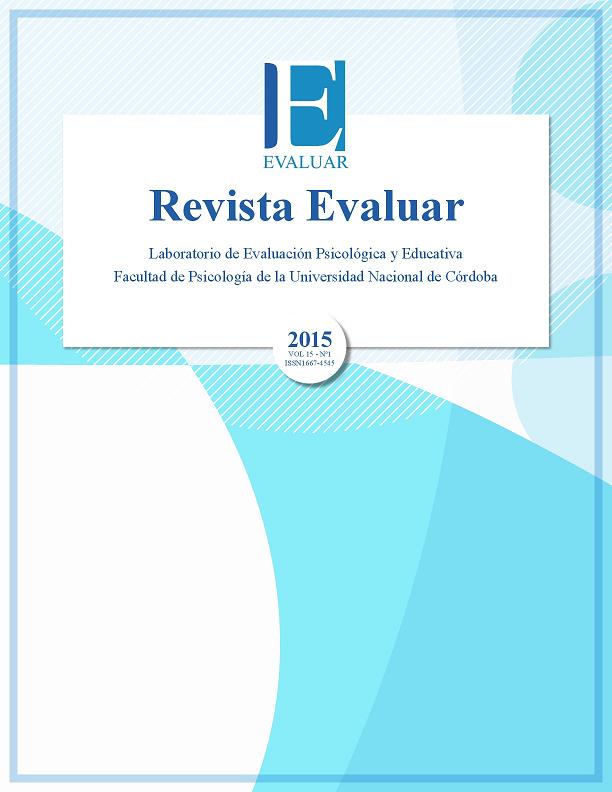Measuring Strategies to Cope with Boredom in Spanish Speaking Population: A Study with Argentinean University Students
DOI:
https://doi.org/10.35670/1667-4545.v15.n1.14910Keywords:
academic boredom, boredom coping, enjoyment, task value, attention, validationAbstract
A study was conducted in order to validate the Boredom Coping Scales and test its psychometric properties on asample of Argentinean university students (namely BCS-AR). The BCS-AR, adapted into Spanish, was applied to a sample
of students at National University of Córdoba and the National Technological University (N = 250). Internal consistency
was estimated through Cronbach's alpha (?). Evidence about the test's internal structure was obtained from evaluating and
comparing three measurement models for boredom coping strategies. Criterion validity evidence was provided by bivariate
correlations with task value, attention, academic boredom and enjoyment. The scales showed acceptable internal
consistency scores (between ? = .69 and ? = .92). The four factor model showed an acceptable fit (?2/df = 1.65, CFI = .95,
GFI = .91, RMSEA = 0.051). Test criterion evidence partially corresponded to the expected results. Results are discussed
within the framework of control-value theory of achievement emotions and boredom coping.
Downloads
References
Acee, T. W., Kim, H., Kim, H. J., Kim, J., Chu, H. N. R., Kim, M., Cho, Y., & Wicker, F. (2010). Academic Boredom in Under-and Over-Challenging Situations. Contemporary Educational Psychology, 35, 17-27. doi: 10.1016/j.cedpsych.2009.08.002
Albright, J. J., & Hun M. P. (2009). Confirmatory Factor Analysis Using Amos, LISREL, Mplus, and SAS/STAT CALIS. Working Paper. The University Information Technology Services (UITS) Center for Statistical and Mathematical Computing, Indiana University.
Arbuckle, J. L. (2010). IBM SPSS Amos 19 User’s Guide. Chicago, IL: IBM.
Arias, B. (2008). Desarrollo de un Ejemplo de Análisis Factorial Confirmatorio con LISREL, AMOS y SAS. Seminario de Actualización en Investigación sobre Discapacidad SAID 2008. University of Valladolid.
Aron, A., & Aron, E. (2001). Estadística para psicología. Buenos Aires: Prentice Hall.
Daschmann, E. C., Goetz, T., & Stupinsky R. H. (2012). Exploring the Antecedents of Boredom: Do Teaches Know Why Their Students Are Bored? S/D.
De Castro Marzo, D. (2011). Construcción y Análisis de Fiabilidad y Validez de un Test de Medida de Imaginación y Comprobación de los Factores que la componen. University of Zaragoza, Spain.
Eccles, J. S. (2005). Subjective task value and the Eccles et al. model of achievement-related choices. In A. J. Elliot & C. S. Dweck (Eds.), Handbook of competence andmotivation (pp. 105-121). New York, NY: Guilford Press.
Elliot, A. J. (1999). Approach and avoidance motivation and achievement goals. Educational Psychologist, 34, 149–169.
Eren, A. (2013). Prospective Teachers’ Perceptions of Instrumentality, Boredom Coping Strategies, and Four Aspects of Engagement. Teaching Education, 24(3), 302-326. doi: 10.1080/10476210.2012.724053
Farmer, R., & Sundberg, N. D. (1986). Boredom Proneness-The Development and Correlates of a New Scale. Journal of Personality Assessment, 50(1), 4-17.
Figueroa, M., & Cohen Imach, S. (2006). Estrategias y Estilos de Afrontamiento del Estrés en Adolescentes. En E. N. Contini de González (comp.). Pensar la adolescencia hoy. De la psicopatología al bienestar psicológico (pp. 29-52). Buenos Aires: Paidós.
Frias Jimenez, R. A., Arias, M. G., & González Laucirica, A. M. (2013). Metodología de Validación de Gestión del Cliente Interno en Procesos Empresariales. S/D.
Furlan, L., Sánchez-Rosas, J., Heredia, D., Piemontesi, S., & Illbele, A. (2009). Estrategias de aprendizaje y ansiedad ante los exámenes en estudiantes universitarios. Pensamiento psicológico, 5(12), 117-124.
George, D., & Mallery, P. (2007). SPSS for Windows step by step: A simple guide andreference. 11.0 update (7th ed.). Boston: Allyn & Bacon.
Goetz, T., Frenzel, A. C., Stoeger, H., & Hall, N. C. (2010). Antecedents of everyday positive emotions: an experience sampling analysis. Motivation and Emotion, 34(1),49-62. doi: 10.1007/s11031-009-9152-2
Goetz, T., Ludtke, O., Nett U. E., Keller, M. M., & Lipnevich, A. A. (2013). Characteristics of Teaching and Students’ Emotions in the Classroom: Investigating Differences Across Domains. Contemporary Educational Psychology, 38(4).383-394. doi: 10.1016/j.cedpsych.2013.08.001
Goetz, T., & Nett, U. E. (2008). Coping with boredom scales. Codebook of the Coping withBoredom Scales. Math related version. Empirical Educational Research, University of Konstanz / Thurgau University of Teacher Education.
Goetz, T., Pekrun, R., Hall, N., & Haag, L. (2006). Academic emotions from a social-cognitive perspective: antecedents and domain specificity of students’ affect in the context of Latin instruction. British Journal of Educational Psychology, 76(2), 289-308. doi: 10.1348/000709905X42860
González, A., Donolo, D., & Rinaudo, C. (2009). Emociones Académicas en Universitarios: Su Relación con las Metas de Logro. Ansiedad y Estrés, 15(2), 263-277.
González, A., Paolini, V., & Rinaudo, C. (2013). Aburrimiento y disfrute en clase de lengua española en secundaria: predictores motivacionales y efectos sobre el rendimiento. Anales de Psicología, 29(2), 426-434. doi: 10.6018/analesps.29.2.136401
Hair, J., Anderson, R., Tatham, R., & Black, W. (1999). Análisis Multivariante. 5ª ed. Prentice Hall: Madrid, Spain.
Holahan, C. J., Moos, R. H., & Schaefer, J. A. (1996). Coping, stress resistance, and growth: Conceptualizing adaptive functioning. In M. Zeidner & N. S. Endler (Eds.), Handbook of coping. Theory, research, applications. New York: John Wiley & Sons,Inc.
Hu, L. T., & Bentler, P. M. (1998). Fit indices in covariance structure modeling: Sensitivity to under-parameterized model misspecification. Psychological Methods, 3(4), 424-453.
Lazarus, R.,& Folkman, S. (1985). If It Changes It Must Be a Process: Study of Emotion and Coping During Three Stages of a College Examination. Journal of Personalityand Social Psychology, 48(1), 150-170.
Mann, S., & Robinson, A. (2009). Boredom in the lecture theatre: an investigation into the contributors, moderators and outcomes of boredom amongst university students. British Educational Research Journal, 35(2), 243-258. doi: 10.1080/10476210.2012.01411920802042911
Martinez Ortega, R. M., Tuya Pendás, L. C., Martinez Ortega, M., Pérez Abreu, A., & Cánovas, A. M. (2009). El coeficiente de Correlación de los Rangos de Spearman, Caracterización. Revista Habanera de Ciencias Médicas, 8(2), 1-19.
Massingham, P., & Herrington, T. (2006). Does Attendance Matter? An Examination of Student Attitudes, Participation, Performance and Attendance. Journal of University Teaching & Learning Practice, 3(2), 83-103.
Nett, U. E., Goetz, T., & Daniels, L. M. (2010). What to do when feeling bored? Students strategies for coping with boredom. Learning and Individual Differences, 20, 626-638. doi: 10.1016/j.lindif.2010.09.004
Pekrun, R. (1992). The Impact of Emotions on Learning and Achievement: Towards a Theory of Cognitive/Motivational Mediators. Applied Psychology: An International Review, 41(4), 359-376.
Pekrun, R. (1993). Facets of students' academic motivation: A longitudinal expectancy-value approach. In M. L. Maehr & P. R. Pintrich (Eds.), Advances in motivation andachievement, 8, 139–189.
Pekrun, R. (2006). The control-value theory of achievement emotions: assumptions, corollaries, and Implications for Educational Research and Practice. EducationalPsychology Review, 18(4), 315-341. doi: 10.1007/s10648-006-9029-9
Pekrun, R., Elliot, A. J., & Maier, M. A. (2006). Achievement goals and discrete achievement emotions: A theoretical model and prospective test. Journal of Educational Psychology, 98(3), 583–597. doi: 10.1037/0022-0663.98.3.583
Pekrun, R., Goetz, T., Daniels, L. M., Stupinsky, R. H., & Perry, R. P. (2010). Boredom in achievement settings: exploring Control-Value antecedents and performance outcomes of a neglected emotion. Journal of Educational Psychology, 102(3), 531-549. doi: 10.1037/a0019243
Pekrun, R., Goetz, T., Frenzel, A., Barchfeld, P., & Perry, R. (2011). Measuring Emotions in Students` Learning and Performance: The Achievement Emotions Questionnaire (AEQ). Contemporary Educational Psychology, 36, 36-48. doi: 10.1016/j.cedpsych.2010.10.002
Pekrun, R., Goetz, T., Titz, W., & Perry, R. P. (2002). Academic emotions in students' self-regulated learning and achievement: A program of qualitative and quantitative research. Educational psychologist, 37(2), 91-105. doi: 10.1207/S1532698EP3702_4
Pekrun, R., & Stephens, E. J. (2010). Achievement Emotions: A Control-Value Approach. Social and Personality Psychology Compass, 4(4), 238–255. doi: 10.1111/j.1751-9004.2010.00259.x
Pérez-Gil, J., Chacón Moscoso, S., & Moreno Rodríguez, R. (2000). Validez de Constructo: el Uso de Análisis Factorial Exploratorio-Confirmatorio Para Obtener Evidencias de Validez. Psicothema, 12(2), 442-446.
Pérez, E., Medrano, L., & Sánchez-Rosas, J. (2013). El pathanalysis: conceptos básicos y ejemplos de aplicación. Revista de la Asociación Argentina de Ciencias del Comportamiento, 5, 52-66.
Perry, R. P., Hladkyj, S., Pekrun, R., & Pelletier, S. (2001). Academic Control and Action Control in the Achievement of College Students: A Longitudinal Field Study. Journal of Educational Psychology, 93(4), 776-789. doi: 10.1037//OO22-0663.93.4.776
Piemontesi, S., Heredia, D., Furlan, L., Sánchez, J., & Martínez, M. (2012). Ansiedad ante los exámenesy estilos de afrontamiento ante el estrés académicoen estudiantes universitarios. Anales de Psicología, 28(1), 89-96.
Pintrich, P. R., Smith, D. A. F., García, T., & McKeachie, W. J. (1993). Reliability and predictive validity of the motivated strategies for learning questionnaire (MSLQ). Educational and Psychological Measurement, 53, 810–814.
Reeve, J., & Tseng, C. M. (2011). Agency as a fourth aspect of students’ engagement during learning activities. Contemporary Educational Psychology, 36(4), 257–267. doi: 10.1016/j.cedpsych.2011.05.002
Rey, M., Blasco, T., & Borrás, X. (2000). Efectos de un procedimiento de inducción de estados de ánimo sobre la autoeficacia. Anales de Psicología, 16, 23-31.
Rosegard, E., & Wilson, J. (2013). Capturing Students` Attention: An Empirical Study. Journal of the Scholarship of Teaching and Learning, 13(5), 1-20.
Sánchez-Rosas, J. (2015a). The Achievement Emotions Questionnaire-Argentine (AEQ-AR): internal and external validity, reliability, gender differences and norm-referenced interpretation of test scores. Evaluar, 41-74.
Sánchez-Rosas, J. (2015b). Validation of the Achievement Goal Questionnaire–Revised in Argentinean university students (A-AGQ-R). International Journal of Psychological Research, 8(1), 10-23.
Sánchez-Rosas, J., & Pérez, E. (2015). Measuring threats, benefits, emotional costs and avoidance of academic help seeking in Argentinian university students. Pensamiento Psicológico, 13(2), 49-64. doi: 10.11144/Javerianacali.PPSI13-2.mtbe
Sánchez-Rosas, J., Piotti, A., Sánchez, V., Pereira, A., & Debat, E. (2011). Implicancias delinterés, la importancia y la utilidad de los materiales y contenidos de aprendizaje para las emociones académicas. Presented at the III Congreso de Psicología de la Facultad de Psicología de la Universidad Nacional de Córdoba, Argentina.
Sánchez-Rosas, J., Takaya, P. B., & Molinari, A. V. (2016). The Role of Teacher Behavior, Motivation and Emotion in Predicting Academic Social Participation in Class. Pensando Psicología, 12(19), 39-53. doi: http://dx.doi.org/10.16925/pe.v12i19.1327
Sánchez-Rosas, J., Takaya, P. B., & Molinari, A. V. (2016). Atención en clase: rol predictivo del comportamiento docente, valor de la tarea, autoeficacia, disfrute y vergüenza. Psiencia. Revista Latinoamericana de Ciencia Psicológica.
Tze, M. C. (2011). Investigating Academic Boredom in Canadian and Chinese Students. Thesis for the degree of Master of Education in Psychological Studies in Education. Department of Educational Psychology. University of Alberta. Edmonton. Canada.
Tze, M. C., Daniels, L. M., & Klassen, R. M. (2015). Evaluating the Relationship Between Boredom and Academic Outcomes: A Meta-Analysis. Educational PsychologicalReview. 1-26. doi: 10.1007/s10648-015-9301-y
Vázquez Valverde, C., Crespo Lòpez, M., & Ring, J. (2000). Estrategias de afrontamiento. En A. Bulbena, G. Berrios y Fernández de Larrinoa, P. (Eds), Medición clínica en Psiquiatría y Psicología (pp. 425-446). Barcelona: Masson.
Vodanovich, S. J., Weddle, C., & Piotrowski, C. (1997). The relationship between boredom proneness and internal and external work values. Social Behavior and Personality, 25, 259–264.
Vogel-Walcutt, J. J., Fiorella, L., Carper, T., & Schatz, S. (2011). The definition, assessment, and mitigation of state boredom within educational settings. Educational Psychology Review, 24, 89-111. doi: 10.1007/s10648-011-9182-7
Weiner, B. (1985). An attributional Theory of Achievement Motivation and Emotion. Psychological Review, 92(4), 548-573.
Wolters, C. A., & Benzon, M. B. (2013). Assessing and predicting college students’ use of strategies for the self-regulation of motivation. The Journal of Experimental Education, 81(2), 199-221. doi: 10.1080/00220973.2012.699901
Wood, A. M. (1998). The Effects of teacher enthusiasm on student motivation, selective attention and text memory. Thesis for the degree of Doctorate of Philosophy Department of Psychology. The Universityof Western Ontario, Canada.
Downloads
Published
How to Cite
Issue
Section
License
Copyright (c) 2015 Javier Sánchez Rosas, Juan Bedis

This work is licensed under a Creative Commons Attribution 4.0 International License.
Revista Evaluar aplica la Licencia Internacional de Atribuciones Comunes Creativas (Creative Commons Attribution License, CCAL). Bajo esta licencia, los autores retienen la propiedad de copyright de los artículos pero permiten que, sin que medie permiso de autor o editor, cualquier persona descargue y distribuya los artículos publicados en Evaluar. La única condición es que siempre y en todos los casos se cite a los autores y a la fuente original de publicación (i.e. Evaluar). El envío de artículos a Evaluar y la lectura de los mismos es totalmente gratuito.




_(3).jpg)



.jpg)



